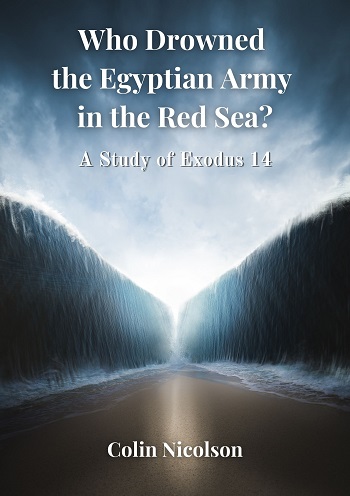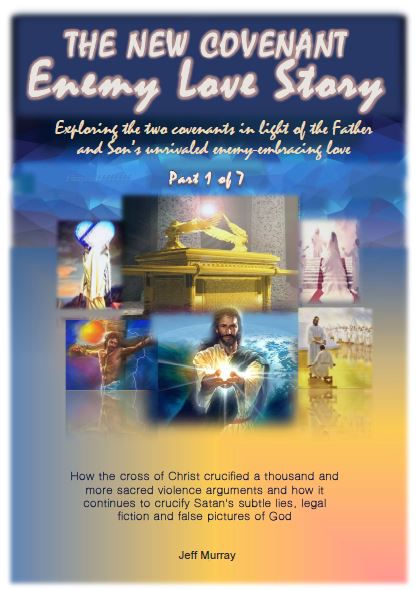"The Godhead...gave Themselves..."
Any presentation of Ellen White's pro-Trinitarianism is NEVER complete without referencing the infamous "Counsels on Health" (1923) quotation.
It is the glory of the gospel that it is founded upon the principle of restoring in the fallen race the divine image by a constant manifestation of benevolence. This work began in the heavenly courts. There God decided to give human beings unmistakable evidence of the love with which He regarded them. He "so loved the world, that He gave His only-begotten Son, that whosoever believeth in Him should not perish, but have everlasting life." John 3:16. The Godhead was stirred with pity for the race, and the Father, the Son, and the Holy Spirit gave Themselves to the working out of the plan of redemption. In order fully to carry out this plan, it was decided that Christ, the only-begotten Son of God, should give Himself an offering for sin. What line can measure the depth of this love? God would make it impossible for man to say that He could have done more. With Christ He gave all the resources of heaven, that nothing might be wanting in the plan for man's uplifting. Here is love--the contemplation of which should fill the soul with inexpressible gratitude! Oh, what love, what matchless love! The contemplation of this love will cleanse the soul from all selfishness. It will lead the disciple to deny self, take up the cross, and follow the Redeemer. [EGW, CH 222.2]
For many SDA's, this quotation is positive "proof" that Mrs. White believed in a "Godhead" composed of three divine beings, who "gave Themselves" to redeem the human race. I will not attempt to argue her belief one way, or the other. Yet, as referenced in my other blogs, understanding, and acknowledging EGW's frequent literary copying from various Protestant sources, places most of her Trinitarian sounding quotations within an understandable context. The "Counsels on Health" quotation was most probably paraphrased from a sermon entitled: THE LOVE OF GOD, AND THE RESPONSE DUE TO THIS LOVE, by Adam Formen Leven, 1893, pp. 10-22.
One thing is clear from a careful reading of Leven's sermon: He did NOT believe in a Trinitarian "Godhead" of three divine beings. Ironically enough, Leven's presentation of the manifestation of God's love, (although Trinitarian), is much more palatable than the current SDA (Tritheistic) presentation of the same.
Since this EGW quotation has been the source of much controversy, and varied interpretation, it certainly deserves a closer examination. Before we examine the sermon of Rev. Adam Leven, lets look again at the common interpretation [or misinterpretation] of the EGW quote itself. Emphasis will be supplied in order to highlight the most common SDA interpretation of EGW's intended meaning of the term "Godhead."
God = Godhead = Three Divine Beings = Three Deities = Three Gods = Tritheism
"It is the glory of the gospel that it is founded upon the principle of restoring in the fallen race the divine image [of the Deities] by a constant manifestation of benevolence. This work began in the heavenly courts. There [the Deities] decided to give human beings unmistakable evidence of the love with which [They] regarded them. [They] "so loved the world, that [They] gave [Their] only-begotten Son, that whosoever believeth in Him should not perish, but have everlasting life." John 3:16.
The [Deities] [were] stirred with pity for the race, and the Father, the Son, and the Holy Spirit gave Themselves to the working out of the plan of redemption. In order fully to carry out this plan, it was decided that Christ, the only-begotten Son of God, should give Himself an offering for sin. What line can measure the depth of this love? [The Deities] would make it impossible for man to say that [They] could have done more. With Christ [They] gave all the resources of heaven, that nothing might be wanting in the plan for man's uplifting. Here is love--the contemplation of which should fill the soul with inexpressible gratitude [toward the Deities]! Oh, what love, what matchless love [of the Deities]! The contemplation of this love will cleanse the soul from all selfishness. It will lead the disciple to deny self, take up the cross, and follow the Redeemer." [EGW, CH 222.2; emphasis supplied]
I will let the candid reader determine the correctness of the above interpretation, along with any alternative interpretations. It is my personal belief that Rev. Adam Leven's sermon was source material for EGW's infamous "Godhead" quotation. Yet, unlike other examples of copying, where whole sentences and word phrases are copied in verbatim, this is NOT the case with Leven's sermon. In this example, parallel themes are used with paraphrased words. While it could be argued that with any story telling, common words and phrases are used; the frequency and order of such usage largely determines whether it was coincidental, or intentional. It is possible that I am entirely wrong for thinking that EGW copied from Leven's sermon, and in this instance would NOT be dogmatic about any similarities between EGW and Leven. The following will compare EGW and Leven's word phrases, and themes, in order to determine the truth of the matter.
EGW
It is the glory of the gospel that it is founded upon the principle of restoring in the fallen race the divine image by a constant manifestation of benevolence.
LEVEN
The Apostle pursues this theme ["God is love"] in its development in the annals of human redemption, he recognizes there the most stupendous manifestation of the Divine benignity. [emphasis mine] It is a glorious and inspiring fact, that the free, unconstrained love of God, is the source of human redemption.
COMMENT The synonym for "benignity" is benevolence.
EGW
This work began in the heavenly courts. There God decided to give human beings unmistakable evidence of the love with which He regarded them. He "so loved the world, that He gave His only-begotten Son, that whosoever believeth in Him should not perish, but have everlasting life." John 3:16.
COMMENT
According to EGW, it was God the Father, who decided in the heavenly courts to "give human beings unmistakable evidence of the love with which He regarded them" through the gift of His Son.
LEVEN
God's bosom was the birth-place of the whole scheme of salvation. Scripture lends its emphatic testimony to this aspect of the truth, " When there was no eye to pity and no hand to help, God's own eye pitied and his arm brought salvation." "God so loved the world as to give his only begotten Son for it, that whosoever believeth in him should not perish, but have everlasting life.''....But to transfer ourselves to the other element illustrative of the matchlessness of the love, of God, it is to be found in the fact, that he sent his Son on the errand of our redemption. It is obvious, that it is the love of God the Father, which the Apostle specially represents.
COMMENT
It is also obvious that Both EGW and Leven understand the overall biblical revelation to be a manifestation of the great pity, and infinite love of God the Father.
EGW
The Godhead was stirred with pity for the race, and the Father, the Son, and the Holy Spirit gave themselves to the working out of the plan of redemption. In order fully to carry out this plan, it was decided that Christ, the only-begotten Son of God, should give Himself an offering for sin.
COMMENT
"The word ‘Godhead’ does not necessarily mean that ‘the three’ were stirred with pity, which is the first reaction, but the Father was stirred with pity for the fallen race. If you read the first paragraph again, you will see that it was the Father who was stirred enough to send His beloved Son. And in the second paragraph, again it is the Father who gave all the resources of heaven. (This does not mean that the Son did not have infinite pity, but the tenor of the passage is the Father’s love and concern for the human race)
"Another query appears to say “the Father, the Son, and the Holy Spirit gave themselves to the working out of the plan of redemption”, meaning they ‘worked the plan out’ together, however, this is not in harmony with many other Spirit of Prophecy statements.
• “The plan of salvation devised by the Father and the Son will be a grand success.” Signs of the Times. Jun 17. 1903.
• “Before the fall of man, the Son of God had united with His Father in laying the plan of salvation.” Review & Herald. Sep 13.1906.
• “A covenant has been entered into by the Father and by the Son to save the world through Christ.” Signs of the Times. Oct 10 1892.
• “In counsel together, the Father and the Son determined that Satan should not be left unchecked to exercise his cruel power upon man.” Manuscript 31. 1911.
Remember, Christ is the only being who can enter into all the counsels and purposes of God. Patriarchs and Prophets p34.
• “…and the counsel of peace was between them both.” Zechariah 6:12.13." (Nothing to fear, book 3, pp. 27.28)
LEVEN
...God's love was the fountain head of all spiritual benefits to man. It was his pity, his yearnings of mercy, his ineffable compassions, which projected a scheme of grace for man, which arranged it, which provided its expedients, which undertook its results....You are aware that the entire Godhead is represented as embarked in the enterprise of redemption. The Scriptural disclosures introduce us to an august transaction of Deity, ratified in the high counsels of eternity. The Father commissioned the Son, the Son dedicated himself, the Holy Spirit lent his benign and adorable concurrence to the act....We have, in point of fact, the glorious Godhead, lavishing itself as it were in the impulses of one infinite and surcharging heart of compassion, for perishing man.
COMMENT
Adam Leven is evidently a classic Trinitarian. He perceived God the Father as the "fountain head" of Deity, along with the source of "all spiritual benefits to man. It was his pity, his yearnings of mercy, his ineffable compassions, which projected a scheme of grace for man..." The modern SDA "incarnational Sonship" theory views the "Godhead" as three divine beings, (three divine minds), working together according to assumed Father-Son roles. In contrast, Leven believes "the glorious Godhead" is still one divine being; "one infinite and surcharging heart of compassion."
EGW
What line can measure the depth of this love? God would make it impossible for man to say that He could have done more. With Christ He gave all the resources of heaven, that nothing might be wanting in the plan for man's uplifting. Here is love--the contemplation of which should fill the soul with inexpressible gratitude! Oh, what love, what matchless love! The contemplation of this love will cleanse the soul from all selfishness. It will lead the disciple to deny self, take up the cross, and follow the Redeemer.
LEVEN
....that infinite love bespeaks fervent response from us. The love of God challenges our homage. And such a love! Whether we contemplate it...."herein is love!"
In closing, it probably cannot be proven one way, or the other, if EGW copied from Leven in this instance. The irony is that Adam Leven's exposition of the great, and infinite love of God, (albeit classic Trinitarianism, believing in the doctrine of "eternal Sonship"), appears much more genuine, biblical, and heartfelt than the modern SDA presentation of the same when accepting the doctrine of "incarnational Sonship." We leave the subject by comparing one more quotation from Adam Leven, with another by SDA, Gordon Jenson.
Adam Leven on the great Love of God
"But to transfer ourselves to the other element illustrative of the matchlessness of the love, of God, it is to be found in the fact, that he sent his Son on the errand of our redemption. It is obvious, that it is the love of God the Father, which the Apostle specially represents. I am aware that there is an unfathomable mystery associated with this page of Deity. The full imports of the fact involved in the words, " The Father sent his Son," the mind of man cannot, with all the aids which it can command, comprehend. But yet are there notices of Scripture which, linked with certain significant analogies, lend some illustration to the theme. I do not mean to allege, that the parallel of an earthly parent consigning a beloved son is to be applied without necessary qualifications to Deity. But yet, if Scripture represents the love of God upon the strength of this analogy, it is difficult to understand how the mere profoundness of the subject should forfeit to us the benefit of the illustration. And I submit, that the sacred page at large, when representing the love of God, places it in confederacy with the case of a fond earthly father, consigning a darling son. Who can have forgotten the tribute of fondness involved in the language, "I was from everlasting the Father's delight?" Who can have forgotten the Apostle John's record, "who was in the bosom of the Father?" Who can have forgotten Paul's testimony, "He was the brightness of the Father's glory, and the express image of his person?" Or who can have forgotten God's own attestation, "This is my beloved Son, in whom I am well pleased?" Or again, to refer to passages which express directly the magnitude of the love involved in the Father's consignment of the Son, are they not fraught with most emphatic meaning? " God so loved the world, as to give his only begotten Son for it." "He who spared not his own Son, but delivered him up for us all, how shall he not with him also freely give us all things?" " In this was manifested the love of God toward us, because that God sent his only begotten Son into the world." Thus is the love of the Father toward mankind exhibited in aspects of most touching significance. It is to be represented, that men very generally entertain some estimate of the devoted compassions of the divine Son, our Saviour. His acts of costly renunciation in leaving his original glory are interpreted—are properly interpreted—as pledges of infinite love. But it may be submitted, if a like costly renunciation is not implied on the part of the Father, in consigning his delight from everlasting, to the obscurity, and rigors, and ignominy of a rejected and despised condition. Who can tell what is involved in the Father devoting his beloved Son to the sore travail of man's redemption? And let me take occasion to represent how much the love of God becomes enhanced when contemplated in this medium....
"....But the cost at which the Father devoted the Son, and the cost at which again the Son subjected himself to the hidings of the Father, are trophies which involve a far different, a far more stupendous manifestation of Deity. They impart a magnificence, a height, and depth, and length, and breadth of dimension to the love of God, which rear it to supreme elevation among the transcendent glories of the Eternal. It was invoking the Spirit of this view that an Apostle penned the words, " He who spared not his own Son, how shall he not with him also freely give us all things." It was under the influence of the same magnifying estimate that he again uttered the language, "Thanks be to God for his unspeakable gift." And it was inspired with the same lofty apprehensions, and ravished with the stupendous contemplation, that John was forced to exclaim, "Herein is love, that God sent his Son to be the propitiation for our sins."
Classic example of the theory of "incarnational Sonship"
“In order to eradicate sin and rebellion from the universe and to restore harmony and peace, one of the divine Beings accepted, and entered into, the role of the Father, another the role of the Son. The remaining divine Being, the Holy Spirit,… By accepting the roles that the plan entailed, the divine Beings lost none of the powers of Deity… The divine Beings entered into the roles they had agreed upon before the foundations of the world were laid.” (Gorden Jenson, Adventist Review, October 31, 1996)





